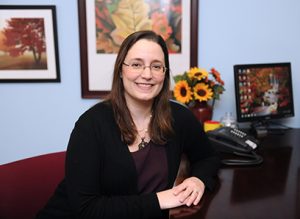A 2015 study by the Centers for Disease Control and Prevention revealed that 17 percent of high school students seriously considered attempting suicide in the previous 12 months. Dana E. Boccio, Ph.D., assistant professor in the Gordon F. Derner Institute of Advanced Psychological Studies, is at the forefront of research and teaching that strives to combat this statistic, leading the way for future generations of psychologists and educators.
A 2015 study by the Centers for Disease Control and Prevention revealed that 17 percent of high school students seriously considered attempting suicide in the previous 12 months. Dana E. Boccio, Ph.D., assistant professor in the Gordon F. Derner Institute of Advanced Psychological Studies, is at the forefront of research and teaching that strives to combat this statistic, leading the way for future generations of psychologists and educators.
 One of Dr. Boccio’s newest research projects is the evaluation of a full-day workshop, “Creating Suicide Safety in the Schools,” developed by Pat Breux, program director at the Society for the Prevention of Teen Suicide. The workshop focuses on suicide risk assessment tools and community resources that can create a more supportive school climate.
One of Dr. Boccio’s newest research projects is the evaluation of a full-day workshop, “Creating Suicide Safety in the Schools,” developed by Pat Breux, program director at the Society for the Prevention of Teen Suicide. The workshop focuses on suicide risk assessment tools and community resources that can create a more supportive school climate.
Dr. Boccio’s multidimensional evaluation examines participants’ knowledge bases before and after the workshop, and follows up to see what changes have been made in school practices. Most of all, she aims to show students that a psychologist’s ability to keenly identify alternative resources can literally save lives.
Students are crucial to executing these projects effectively. Research assistants help with the analysis of data and coding responses in Dr. Boccio’s workshop evaluation, while third-year students will present at the annual convention of the National Association of School Psychologists on the obstacles to continuity of care for suicide prevention, notably in emergency departments.
Dr. Boccio strategically prepares graduate students for work environments that will put their classwork, research and practical experience to the test. She shared how Adelphi’s unique approach to different theoretical orientations empowers students to more thoroughly evaluate a situation—a critical skill set when dealing with the shifting dynamics between students, parents, teachers and healthcare providers.
“Our students are exposed to a wide array of models ranging from psychodynamic to behavioral,” Dr. Boccio said. “There is no ‘one right way’ to look at a problem. A stronger approach is to look at multiple dimensions so that students take away a broader tool kit.”
Understanding how these methods work in real-life settings is a big game changer in the efforts to reduce teen suicide, and Dr. Boccio’s students gain firsthand experience through hands-on research that measures the effectiveness of training models.
Dr. Boccio attributes her students’ successes to an on-campus environment that generates genuine interest among peers, which translates to empathy and enthusiasm in the field. “Adelphi is an atmosphere of respect, where faculty are genuinely interested in what students have to say,” Dr. Boccio said. “Students are encouraged to think outside the box and apply the education they’ve received in and out of the classroom to new situations.”
For further information, please contact:
Todd Wilson
Strategic Communications Director
p – 516.237.8634
e – twilson@adelphi.edu